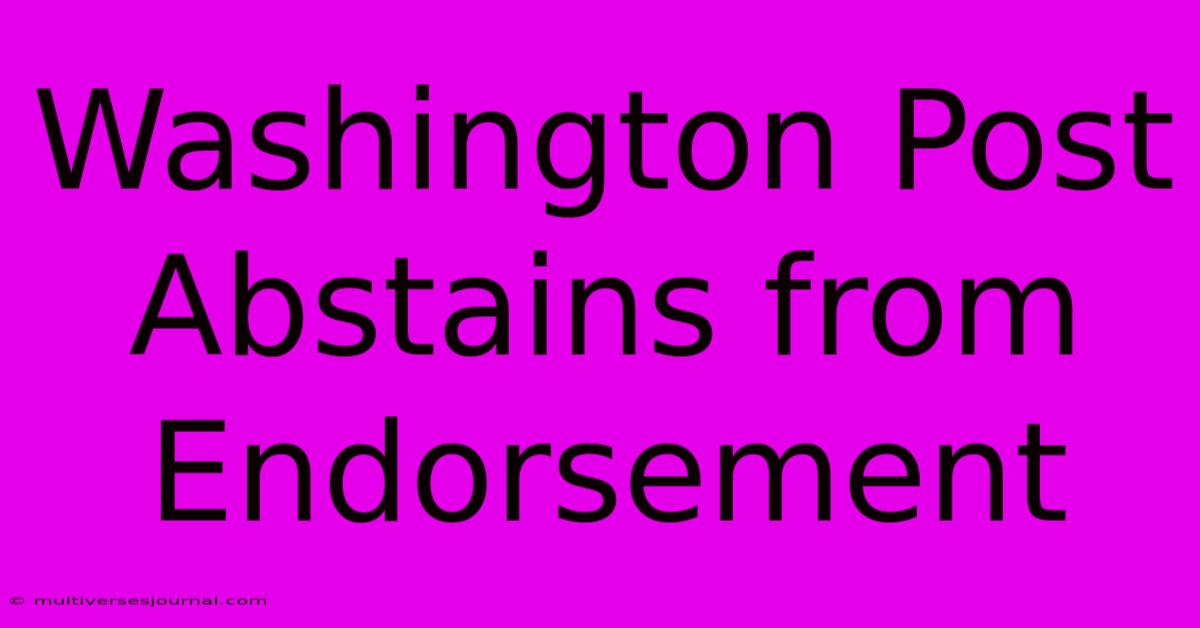Washington Post Abstains From Endorsement

Discover more detailed and exciting information on our website. Click the link below to start your adventure: Visit Best Website multiversesjournal.com. Don't miss out!
Discover more detailed and exciting information on our website. Click the link below to start your adventure: Visit Best Website mr.cleine.com. Don't miss out!
Table of Contents
The Washington Post's Unprecedented Decision: Abstaining from an Endorsement
The 2024 presidential election is shaping up to be a consequential one, with the Washington Post, a leading voice in American journalism, making an unusual move. For the first time in its long history, the Post has chosen to abstain from endorsing a candidate for president. This decision has sparked considerable debate, raising questions about the role of the press in a democracy and the changing landscape of political discourse.
Why the Post Abstained: A Shift in Editorial Strategy
The Washington Post's editorial board explained their decision in a lengthy piece, outlining their reasoning. They emphasized the highly polarized political climate and the deep divisions within the American electorate. The board felt that endorsing a candidate would further fuel these divisions, potentially alienating a significant portion of their readership. Instead, they opted to focus their efforts on providing in-depth reporting, fact-checking, and analysis to help readers make informed decisions.
This decision reflects a growing trend among media outlets. Many newspapers and magazines, faced with the challenge of navigating an increasingly fragmented and polarized media landscape, are rethinking their traditional roles. They are moving away from direct endorsements and placing a greater emphasis on investigative journalism, providing diverse perspectives, and promoting informed public discourse.
The Impact and Implications of the Post's Decision
The Washington Post's decision to abstain from endorsing a candidate is a significant event, signaling a possible shift in the way news organizations engage with the political process. It's too early to say whether this will be a trend adopted by other major publications. However, the Post's decision has certainly sparked important discussions about the role of the press in a democracy and the evolving relationship between media outlets and their readers.
The debate surrounding this decision highlights the complex interplay of journalistic ethics, editorial independence, and public engagement. While some argue that endorsing candidates is an important part of a free press's role in shaping public opinion, others believe that it can be counterproductive in a polarized environment.
Looking Forward: The Future of Media Endorsements
The Washington Post's decision to abstain from endorsing a candidate opens up a dialogue about the future of media endorsements. It raises questions about whether traditional editorial strategies are still effective in today's media landscape. As the 2024 election approaches, we can expect further discussion on this topic as other news organizations navigate their own approaches to political endorsements.
It remains to be seen whether the Washington Post's decision will inspire other outlets to follow suit or whether it will be a unique moment in the evolution of media's role in politics. Regardless of the outcome, this decision has sparked a conversation about the evolving landscape of media and its place in a democracy.

Thank you for visiting our website wich cover about Washington Post Abstains From Endorsement. We hope the information provided has been useful to you. Feel free to contact us if you have any questions or need further assistance. See you next time and dont miss to bookmark.
Thank you for visiting our website wich cover about Washington Post Abstains From Endorsement. We hope the information provided has been useful to you. Feel free to contact us if you have any questions or need further assistance. See you next time and dont miss to bookmark.
Featured Posts
-
Phil Lesh The Heartbeat Of The Grateful Dead
Oct 26, 2024
-
Fire Breaks Out At Karaj Nuclear Facility
Oct 26, 2024
-
Phil Lesh Dead At 84 Remembering The Grateful Dead Bassist
Oct 26, 2024
-
Timberwolves Lineup Combinations Early Signs Of Dominance
Oct 26, 2024
-
Yankees Vs Dodgers World Series History In Charts
Oct 26, 2024
